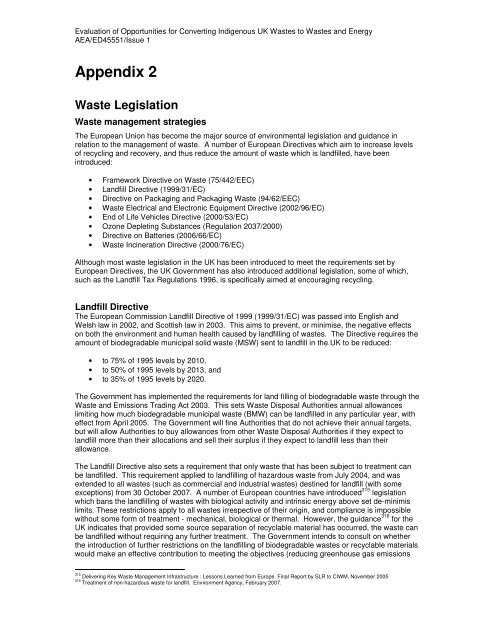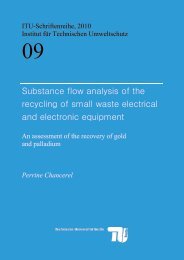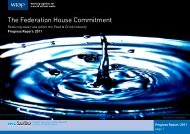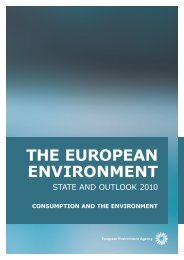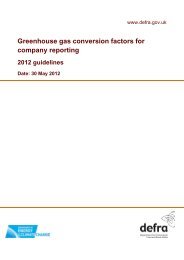to read the full report - Ecolateral by Peter Jones
to read the full report - Ecolateral by Peter Jones
to read the full report - Ecolateral by Peter Jones
You also want an ePaper? Increase the reach of your titles
YUMPU automatically turns print PDFs into web optimized ePapers that Google loves.
Evaluation of Opportunities for Converting Indigenous UK Wastes <strong>to</strong> Wastes and Energy<br />
AEA/ED45551/Issue 1<br />
Appendix 2<br />
Waste Legislation<br />
Waste management strategies<br />
The European Union has become <strong>the</strong> major source of environmental legislation and guidance in<br />
relation <strong>to</strong> <strong>the</strong> management of waste. A number of European Directives which aim <strong>to</strong> increase levels<br />
of recycling and recovery, and thus reduce <strong>the</strong> amount of waste which is landfilled, have been<br />
introduced:<br />
• Framework Directive on Waste (75/442/EEC)<br />
• Landfill Directive (1999/31/EC)<br />
• Directive on Packaging and Packaging Waste (94/62/EEC)<br />
• Waste Electrical and Electronic Equipment Directive (2002/96/EC)<br />
• End of Life Vehicles Directive (2000/53/EC)<br />
• Ozone Depleting Substances (Regulation 2037/2000)<br />
• Directive on Batteries (2006/66/EC)<br />
• Waste Incineration Directive (2000/76/EC)<br />
Although most waste legislation in <strong>the</strong> UK has been introduced <strong>to</strong> meet <strong>the</strong> requirements set <strong>by</strong><br />
European Directives, <strong>the</strong> UK Government has also introduced additional legislation, some of which,<br />
such as <strong>the</strong> Landfill Tax Regulations 1996, is specifically aimed at encouraging recycling.<br />
Landfill Directive<br />
The European Commission Landfill Directive of 1999 (1999/31/EC) was passed in<strong>to</strong> English and<br />
Welsh law in 2002, and Scottish law in 2003. This aims <strong>to</strong> prevent, or minimise, <strong>the</strong> negative effects<br />
on both <strong>the</strong> environment and human health caused <strong>by</strong> landfilling of wastes. The Directive requires <strong>the</strong><br />
amount of biodegradable municipal solid waste (MSW) sent <strong>to</strong> landfill in <strong>the</strong> UK <strong>to</strong> be reduced:<br />
• <strong>to</strong> 75% of 1995 levels <strong>by</strong> 2010,<br />
• <strong>to</strong> 50% of 1995 levels <strong>by</strong> 2013, and<br />
• <strong>to</strong> 35% of 1995 levels <strong>by</strong> 2020.<br />
The Government has implemented <strong>the</strong> requirements for land filling of biodegradable waste through <strong>the</strong><br />
Waste and Emissions Trading Act 2003. This sets Waste Disposal Authorities annual allowances<br />
limiting how much biodegradable municipal waste (BMW) can be landfilled in any particular year, with<br />
effect from April 2005. The Government will fine Authorities that do not achieve <strong>the</strong>ir annual targets,<br />
but will allow Authorities <strong>to</strong> buy allowances from o<strong>the</strong>r Waste Disposal Authorities if <strong>the</strong>y expect <strong>to</strong><br />
landfill more than <strong>the</strong>ir allocations and sell <strong>the</strong>ir surplus if <strong>the</strong>y expect <strong>to</strong> landfill less than <strong>the</strong>ir<br />
allowance.<br />
The Landfill Directive also sets a requirement that only waste that has been subject <strong>to</strong> treatment can<br />
be landfilled. This requirement applied <strong>to</strong> landfilling of hazardous waste from July 2004, and was<br />
extended <strong>to</strong> all wastes (such as commercial and industrial wastes) destined for landfill (with some<br />
exceptions) from 30 Oc<strong>to</strong>ber 2007. A number of European countries have introduced 315 legislation<br />
which bans <strong>the</strong> landfilling of wastes with biological activity and intrinsic energy above set de-minimis<br />
limits. These restrictions apply <strong>to</strong> all wastes irrespective of <strong>the</strong>ir origin, and compliance is impossible<br />
without some form of treatment - mechanical, biological or <strong>the</strong>rmal. However, <strong>the</strong> guidance 316 for <strong>the</strong><br />
UK indicates that provided some source separation of recyclable material has occurred, <strong>the</strong> waste can<br />
be landfilled without requiring any fur<strong>the</strong>r treatment. The Government intends <strong>to</strong> consult on whe<strong>the</strong>r<br />
<strong>the</strong> introduction of fur<strong>the</strong>r restrictions on <strong>the</strong> landfilling of biodegradable wastes or recyclable materials<br />
would make an effective contribution <strong>to</strong> meeting <strong>the</strong> objectives (reducing greenhouse gas emissions<br />
315 Delivering Key Waste Management Infrastructure : Lessons Learned from Europe. Final Report <strong>by</strong> SLR <strong>to</strong> CIWM, November 2005<br />
316 Treatment of non-hazardous waste for landfill. Environment Agency, February 2007.


